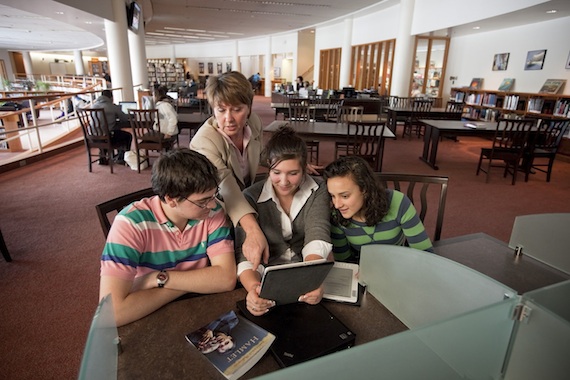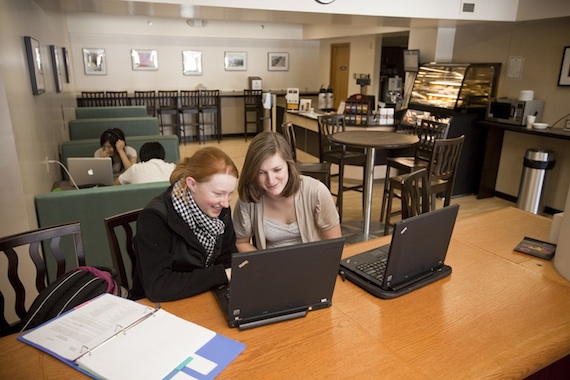Library Evolution | Feature
The All-Digital Library
This is the second segment of a three-part series of articles focused on the changing role of the K-12 library. Each article in the series will look at a how schools are reinterpreting the role of the library and what's being done to reposition it to keep it relevant and fresh in the digital age.
Two years ago, Cushing Academy of Ashburnham, MA made a bold move when it got rid of Fisher-Watkins Library's 40,000 books and replaced them with electronic sources. During the overhaul all resources were converted to digital formats, and the library's Web site was redesigned to provide students and faculty with online resources and tools on a 24/7 basis.
Tom Corbett, the library's executive director, said the sweeping change was part of 450-student Cushing Academy's commitment to becoming a national leader in 21st century secondary education. "We wanted to create a library that reflected the reality of how students conduct research and that fostered what they do," said Corbett. "We needed a facility that went beyond the 'stacks' and embraced the digital future."
Prior to the revamping Corbett said the library was well stocked with printed books and a database collection. "It wasn't a neglected library by any stretch. However, like a lot of high school libraries, it wasn't what the administration or library staff wanted," said Corbett. "The opportunity to change the library dynamics surfaced, so the school's leaders decided to take it."
Out with the Old
Funded internally with the private school's capital funds, the project kicked off with the sale of the library's physical collection. "We had to find new homes for the books and clear the shelves," said Corbett, who was hired in 2009 to oversee the process and run the new library. Books were offered to school departments first and the rest were donated to area libraries.
 ""We wanted to create a library that reflected the reality of how students conduct research and that fostered what they do." --Tom Corbett, Cushing Academy library executive director |
The undertaking whittled Fisher-Watkins Library's collection down to about 10,000 books. Most of the remaining titles left were either contributed by donors or were art or poetry books. "Neither of those subject areas translate well electronically," Corbett explained, adding that the physical collection will not be expanded unless a specific book isn't available in electronic format.
Cushing Academy then hired an architect to redesign the library. The building already had ample "open space," according to Corbett, but needed more steps, doors, furniture, and a cafe where students and faculty could mingle and collaborate. An existing computer lab was converted into a lounge for faculty and staff, new WiFi access points were added, and new electric boxes were installed to accommodate student laptop use in the building. The library also set up a Drupal-based content management system that runs its online catalog and physical circulation setup.
Other additions included new LCD screens that show CNN news and that display book covers of new titles that students and faculty might be interested in. Electronic books were the final piece of the puzzle. After testing out both the Sony Reader and Amazon Kindle the school decided to use a combination of both devices. Students and teachers can also access the books through the library's Web site and read it on their laptops, desktops, and tablets.
Advantages of E-Books
Cushing Academy signed up for a "pay as you use it" arrangement with EB Library (EBL), the library division of ebooks.com, to populate portable reading devices with texts. The service has more than 200,000 academic, copyrighted e-books from university presses and other sources.
"We wanted to get out of the 'purchase the books up front and hope someone uses them' mentality," Corbett explained. "With our new system we can provide access to a much larger set of resources that are paid for as they are used."
Students and teachers search through Fisher-Watkins Library's digital catalog and select one or more texts. The system automatically checks the materials out for the user, and then the school is charge when the materials are used.
"This opens up access to many resources than we could ever manage with a paper-based approach," said Corbett. "Our students have gone from having a local collection of 40,000 resources to a digital collection of over 200,000 academic e-books and over 1 million Kindle e-books."
Challenges of All-Digital
Operating in a purely digital environment comes with its own unique set of challenges. Authentication issues that are commonly addressed by librarians and IT departments are exacerbated and become even more onerous when libraries provide remote access to their resources.
"The more resources you add to your lineup, the more challenging it becomes," said Corbett. Fisher-Watkins Library uses a single sign-on (SSO) system that allows a user to log in once and gain access to all of the facility's systems without having to repeat the process.
The SSO system isn't a cure-all for the library's authentication needs. When students use federated search [information retrieval technology that allows the simultaneous search of multiple searchable resources], for example, "delivering those results when students are located off campus can be pretty tricky," said Corbett, whose team is still looking at ways to address that ongoing issue.
 The library's redesign incorporated a cafe, a lounge for faculty and staff, and support software and hardware for student mobile devices. |
Corbett said the library has also run into an issue when attempting to provide access to all digital titles on all mobile devices.
"Because of current [copyright] management, our EBL books don't work with the Kindles," said Corbett, "but they do operate on devices like the Sony e-book and the Nook." He said a Web browser on a laptop can often fill that gap since students don't always read materials cover-to-cover. "In many cases they are just grabbing parts of the content," said Corbett, "so browser access is adequate, but it's still not the distraction-free environment that a paper-based book provides."
Corbett said he hopes that time will resolve some of the challenges he's grappling with. "Part of it is waiting for the technology and the service to get their act together," he said, "and the rest of it is getting the right formats into the students' hands regardless of whether they're using a Kindle, a tablet, or a laptop."
Two years after their traditional library was digitized and reconstructed Cushing Academy students are using the space very differently than they did in early 2009. They push tables together to work in groups; they check out Kindles and Sony Readers instead of paper books; and they learn about information literacy in one of the building's two classrooms. "It's become a much more open and collaborative space," said Corbett, "instead of just a place where users come to check out materials."
The Library Evolved This article is one part of a three-part series. Use the links below to locate other articles in this series. Note: Part 3 has not yet been published. Part 1: iCommons: The Library Evolved, a look at the "iCommons" at the Oxbridge Academy of the Palm Beaches Part 2: The All-Digital Library, an exploration of Cushing Academy's Fisher-Watkins Library. Part 3: Coming in November! |
About the Author
Bridget McCrea is a business and technology writer in Clearwater, FL. She can be reached at bridgetmc@earthlink.net.
